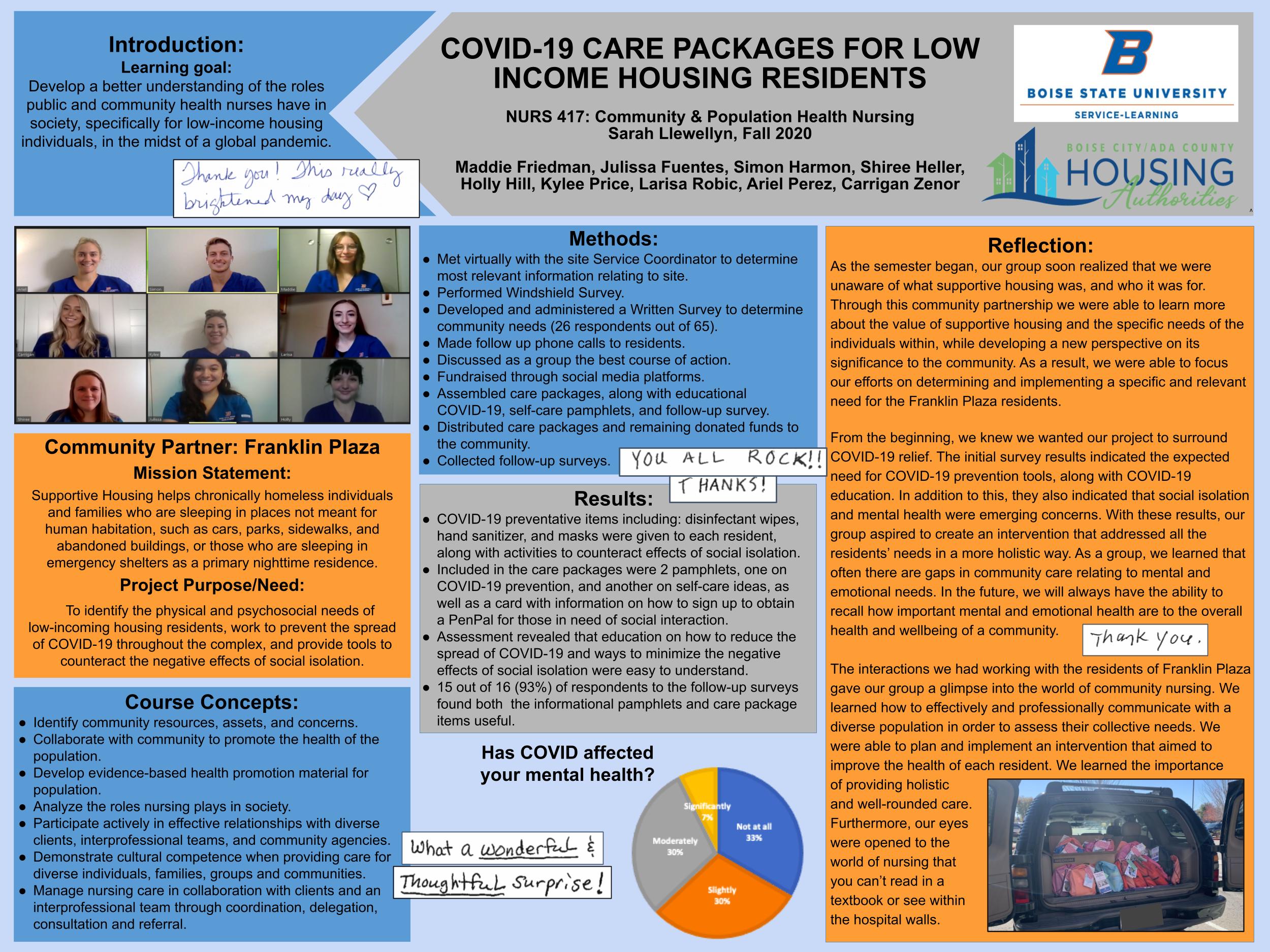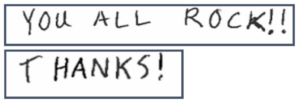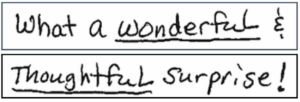Maddie Friedman, Julissa Fuentes, Simon Harmon, Shiree Heller, Holly Hill, Kylee Price, Larisa Robic, Ariel Perez, Carrigan Zenor
Dr. Sarah Llewellyn (PhD, MN, RN) – NURS 417
Boise City Ada County Housing Authority

Introduction
Learning Goals:
Develop a better understanding of the roles public and community health nurses have in society, specifically for low-income housing individuals, in the midst of a global pandemic.

Reflection
As the semester began, our group soon realized that we were unaware of what supportive housing was, and who it was for. Through this community partnership we were able to learn more about the value of supportive housing and the specific needs of the individuals within, while developing a new perspective on its significance to the community. As a result, we were able to focus our efforts on determining and implementing a specific and relevant need for the Franklin Plaza residents.
From the beginning, we knew we wanted our project to surround COVID-19 relief. The initial survey results indicated the expected need for COVID-19 prevention tools, along with COVID-19 education. In addition to this, they also indicated that social isolation and mental health were emerging concerns. With these results, our group aspired to create an intervention that addressed all the residents’ needs in a more holistic way. As a group, we learned that often there are gaps in community care relating to mental and emotional needs. In the future, we will always have the ability to recall how important mental and emotional health are to the overall health and wellbeing of a community.

The interactions we had working with the residents of Franklin Plaza gave our group a glimpse into the world of community nursing. We learned how to effectively and professionally communicate with a multitude of different people in order to assess their collective needs. We were able to plan and implement an intervention that aimed to improve the health of each resident. We learned the importance of providing holistic and well-rounded care. Furthermore, our eyes were opened to the world of nursing that you can’t read in a textbook or see within the hospital walls.

Community Partner: Boise City Ada County Housing Authority
Mission Statement:
Supportive Housing helps chronically homeless individuals and families who are sleeping in places not meant for human habitation, such as cars, parks, sidewalks, and abandoned buildings, or those who are sleeping in emergency shelters as a primary nighttime residence.
Project Purpose:
To identify the physical and psychosocial needs of low-incoming housing residents, work to prevent the spread of COVID-19 throughout the complex, and provide tools to counteract the negative effects of social isolation.
Course Concepts
- Identify community resources, assets, and concerns.
- Collaborate with community to promote the health of the population.
- Develop evidence-based health promotion material for population.
- Analyze the roles nursing plays in society.
- Participate actively in effective relationships with a wide range of clients, interprofessional teams, and community agencies.
- Demonstrate cultural competence when providing care for a wide range of individuals, families, groups and communities.
- Manage nursing care in collaboration with clients and an interprofessional team through coordination, delegation, consultation and referral.

Methods
- Met virtually with the site Service Coordinator to determine most relevant information relating to site.
- Performed Windshield Survey.
- Developed and administered a Written Survey to determine community needs (26 respondents out of 65).
- Made follow up phone calls to residents.
- Discussed as a group the best course of action.
- Fundraised through social media platforms.
- Assembled care packages, along with educational COVID-19, self-care pamphlets, and follow-up survey.
- Distributed care packages and remaining donated funds to the community.
- Collected follow-up surveys.

Results
- COVID-19 preventative items including: disinfectant wipes, hand sanitizer, and masks were given to each resident, along with activities to counteract effects of social isolation.
- Included in the care packages were 2 pamphlets, one on COVID-19 prevention, and another on self-care ideas, as well as a card with information on how to sign up to obtain a PenPal for those in need of social interaction.
- Assessment revealed that education on how to reduce the spread of COVID-19 and ways to minimize the negative effects of social isolation were easy to understand.
- 15 out of 16 (93%) of respondents to the follow-up surveys found both the informational pamphlets and care package items useful.
Has COVID Affected Your Mental Health?
